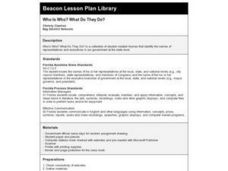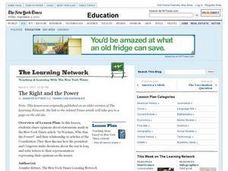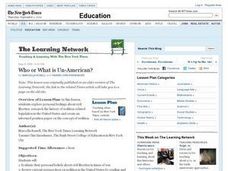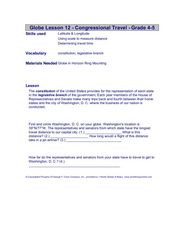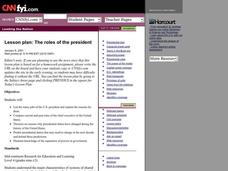Curated OER
The Kite Runner: Citizenship Test
Could you pass a citizenship test? As part of their study of Khaled Hosseini's The Kite Runner and the immigrant experience, class members are presented with a sample citizenship test.
DocsTeach
Court Packing vs. Reorganizing: The Supreme Court in the New Deal
Travel back in time to understand the effects of FDR's New Deal on the Supreme Court. Academics analyze historical documents to understand FDR's attempts to pack the Supreme Court and the opposition he faced. The activity includes a...
DocsTeach
Documenting Key Presidential Decisions
It's match time! Academics participate in an exciting matching game using primary sources. The activity uses documents of key decisions and matches them to the presidents that they are attributed to. Scholars also make a list of key...
US House of Representatives
House History Comes Alive
How reliable is oral history? The resource uses the oral history website to help academics understand the pros and cons of using recollections to teach others. Scholars complete a worksheet, draft a letter to a representative, and...
Curated OER
Writing a Social Studies Essay
For this social studies essay worksheet, students follow the provided steps listed in the graphic organizer to write their own social studies essays. Students also read a sample essay about the U.S. government.
Curated OER
What is a Court?
Students examine and discuss the judicial branch of the U.S. government. They define what a court is, list three characteristics of a trial court and an appellate court, and analyze various trial and appeal situations.
Curated OER
War Making: Executive and Legislative Powers
Students examine executive and legislative powers. In this federal powers lesson, students determine who has the power to wage war in the U.S. government. Students analyze the Constitution and research historical precedents regarding...
Curated OER
Who Is Who? What Do They Do?
Second graders create rhymes in order to remember the names of representatives and executives in our government at the state level.
Curated OER
Who Are My Local Representatives? Can I Influence Their Vote?
Students find out who their national, state, and local representatives are and write and mail a letter to one of them. The letter should be persuasive and should attempt to influence their representative's vote on a given issue.
Curated OER
Benjamin Franklin and the U.S. Constitution
Learners explore U.S. history by completing a quiz about civics. In this Benjamin Franklin lesson, students read assigned text about Franklin's role in the development of the Constitution and the creation of a new society. Learners...
Curated OER
You and the U.S. Constitution
Fourth graders write new rules of their school. In this rules and U.S. Constitution lesson, 4th graders discuss why we celebrate the fourth of July and examine the U.S. Constitution. Students discuss the differences between people now...
Curated OER
Interest Groups in South Carolina Government
Students create an outline and short class presentation about an assigned interest group by conducting research using the Internet and interest group contacts. They evaluate the role of an assigned interest group in the South Carolina...
Curated OER
The Right and the Power
Students read, discuss and analyze the New York Times article "In Wartime, Who Has the Power?" and relate the article to the Constitution. They then brainstorm how the president and Congress make decisions about the war in Iraq and write...
Curated OER
Structure of Congress
Students examine the structure of Congress. They identify the roles of the Democratic and Republician parties and their leaders. They role play the role of congressmen and pretend to pass new legislation.
Curated OER
Federalist 47
Young scholars will analyze and evaluate political propaganda. In this lesson on the Federalist movement, students will examine the Federalist papers and analyze the Anti-Federalist argument mage against constitutional ratification. This...
Curated OER
Who or What is Un-American?
Young scholars explore concepts about civil liberties, research the history of sedition-related legislation in the U.S. and create a position paper on the topic.
Curated OER
Differences and Settlement in the Legislative Budget Process
Students discuss the issues at hand when legislators are trying to agree on policy. In groups, they role-play different roles within a sub-committee when trying to balance the budget. They present their findings to the class and...
Curated OER
Don't Just Dream-Act
Learners create campaign materials to encourage the passage of legislation supporting higher education for immigrant minors. They produce flyers, brochures, pins and a voter presentation for a school fair. To prepare the materials they...
Curated OER
Investigating the Judiciary Act of 1789
Students research the Judiciary Act of 1789 including why it was needed and what it provided. They write a paper using all steps of the writing process outlining their findings.
Curated OER
Creating Laws
Students brainstorm ideas for legislation and present their ideas to the class. They draft a bill and take it through the normal procedures of the Canadian Parliament.
Curated OER
What Are the Ethical Considerations
Students investigate the socioeconomic and environmental issues associated with radon. They examine the laws that exist in New Jersey that pertain to real estate. They work in groups to design new legislation that addresses associated...
Curated OER
Our Country's People Crossword Puzzle
In this US citizens worksheet, students complete a crossword puzzle by answering 19 clues. They use words from a word bank at the bottom of the puzzle, which includes ancestor, citizen, government, president, and immigrant.
Curated OER
Congressional Travel
Students determine the distances traveled by the members of the legislative branch of the US Government. In this travel distance lesson plan, students locate Washington, DC on a globe using the longitude and latitude of the city. They...
Curated OER
The Roles of the President
Young scholars list the many jobs of the U.S. president and explain the reasons for them. They compare current and past roles of the chief executive of the United States.







